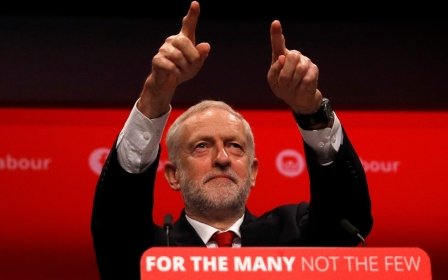From a Palestinian member of the Labour Party: We demand the right to speak about Israel's racism

Dear Jennie Formby and John Cryer MP,
I'm writing to you as a longstanding Palestinian member of the Labour Party about the new code of conduct on anti-Semitism.
I have seen that there has been some criticism of the fact that not all the International Holocaust Remembrance Alliance's working examples have been included word for word in the new code. But, if they were, this would silence me, as someone who has been directly affected by Israeli state racism.
Oppressed groups
It would be wrong, in drawing up guidelines about one form of racism, to prevent other forms of racism from being called out or to limit the rights of other oppressed groups to speak about their own oppression.
I was born in what is now west Jerusalem. During the war to establish the state of Israel, my family and I were forced from our home, when I was a young child. To this day, I have been prevented from returning to my home, simply because I am a Palestinian Arab - whereas any Jewish person from anywhere in the world could and can automatically become a citizen of the state.
The establishment of the Israeli state, as the ethnically defined state of what was then a minority of the population of Palestine, was discriminatory and racist. And laws and practices that discriminate on the basis of race and religion - against my people, the Palestinians - have continued to this day.
This is not only the case in relation to the occupied Palestinian territories, the illegal settlements, and the violence and abuses against Palestinian people in Gaza, but also within Israel's borders.
It would be wrong, in drawing up guidelines about one form of racism, to prevent other forms of racism from being called out or to limit the rights of other oppressed groups to speak about their own oppression
Just this week, the Israeli government proposed legislation to allow the state to segregate Jews and Arabs. For Arabs who live in Israel, segregation is already their daily reality. But this new bill gives the state the permission officially and explicitly to discriminate on the basis of race and religion.
This attempt to emulate the policies of apartheid South Africa is a gateway, we believe, for the Israeli government to pass sweeping new laws to further erode the rights of Arabs and non-Jewish minorities and impose Jewish religious law in a country that brands itself a democracy.
Historical responsibility
The reference in the IHRA document to banning the identification of the state of Israel as a racist endeavour would prohibit me and many other Palestinians from speaking out about our first-hand experiences of that racism. To prevent us from speaking about the oppression we have faced would be both discriminatory and directly undermine our rights.
This point seems to have been entirely absent from the debate around the code of conduct.
Of course if, when highlighting that racism, someone were to use an anti-Semitic trope or blame Jewish people or Judaism for the actions of the Israeli state, that would be unacceptable. We simply demand the right to speak about our experiences and make legitimate, evidence-based criticism of Israel, its foundation, its laws and practices.
We want everyone to have that right, not just us, as part of an open, free debate on a major international conflict, for which Britain bears significant historical responsibility
And we want everyone to have that right, not just us, as part of an open, free debate on a major international conflict, for which Britain bears significant historical responsibility. As a Labour member, I at least expect to have this right respected within my own party.
Many of those who are insisting upon a word for word repetition of the IHRA working examples are staunch advocates of Israeli government policies. What is driving this campaign is clearly an attempt to protect and improve Israel’s tarnished image, silence Palestinians and discredit those who support our rights.
A legitimate debate
Even Kenneth Stern, the lead author of the IHRA document, has said it was intended for data collecting purposes on anti-Semitism, and that it was not intended to curtail speech.
It's right that Labour, as a political party, has clarified and contextualised this, making sure that the incredibly short, often vaguely worded IHRA document, cannot be misinterpreted or misused in a way that would stifle legitimate debate.
The code you have introduced ensures that anti-Semitism is not tolerated within the party, while also ensuring that the rights of Palestinians are not infringed and that free and fair speech about Israel is not silenced.
I hope that the party will maintain its code of conduct. If replaced with a word-for-word copy of the IHRA document, then I, as a member, would be prevented from speaking about what happened to me and my family – our dispossession, forced removal and permanent ban from our home purely because we were Arab.
This was conducted by the new Israeli state; a state that was founded on discrimination towards Arab people on the basis of religion and ethnicity. If that's not a racist endeavour, I don't know what is. And I should have the freedom, as the victim of that racism, to say so.
Yours,
Ghada
-Ghada Karmi is a Palestinian doctor, academic and author.
The views expressed in this article belong to the author and do not necessarily reflect the editorial policy of Middle East Eye.
Photo: Palestinian youths mourn at al-Shifa hospital morgue on 14 July, 2018 after two teenagers were killed in one of a series of Israeli raids. Aged 15 and 16, two Palestinians were on a road west of Gaza City when an air strike struck a nearby empty building (AFP)
Middle East Eye propose une couverture et une analyse indépendantes et incomparables du Moyen-Orient, de l’Afrique du Nord et d’autres régions du monde. Pour en savoir plus sur la reprise de ce contenu et les frais qui s’appliquent, veuillez remplir ce formulaire [en anglais]. Pour en savoir plus sur MEE, cliquez ici [en anglais].





